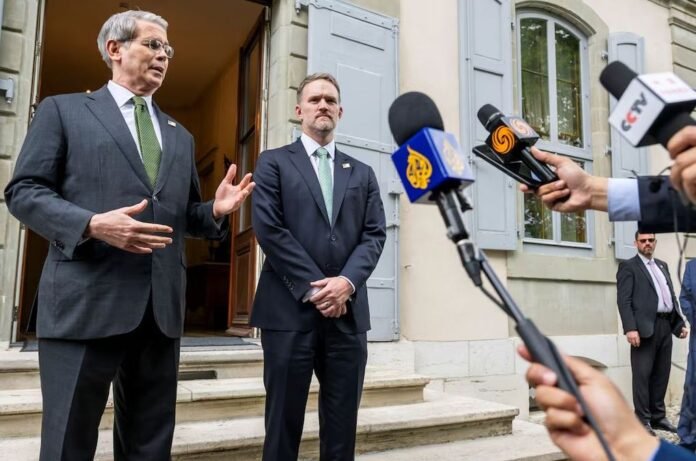In a significant diplomatic and economic development, the United States and China have announced “substantial progress” in trade talks held in Geneva on May 10–11, raising hopes of de-escalation in a tariff war that has rattled global markets for months.
Chinese Vice Premier He Lifeng, leading Beijing’s delegation, said the talks with US Treasury Secretary Scott Bessent and Trade Representative Jamieson Greer were “candid, in-depth, and constructive,” according to Reuters. He added that both sides agreed to establish a formal consultation mechanism to address economic and trade issues of mutual concern.
Bessent told Reuters that President Donald Trump had been “fully informed” of the discussions and that a detailed joint statement would be released on Monday. “We made substantial progress… in the spirit of cooperation, shared interest, and mutual respect,” he said.
Trump’s tariff saga
This diplomatic thaw follows President Donald Trump’s unexpected escalation earlier this year, when he slapped a 145 per cent tariff on a wide swath of Chinese imports, ranging from steel and electric vehicles to electronics, textiles, and rare earth metals. The US administration justified the move by declaring a national economic emergency, citing the ballooning $1.2 trillion trade deficit with China, according to the US Department of Commerce. In swift retaliation, China’s Ministry of Commerce imposed reciprocal tariffs on key American exports, including agricultural produce, semiconductors, industrial machinery, and pharmaceuticals. While Beijing insisted it did not seek a trade war, Vice Premier He told Reuters that China was “prepared to fight to the end.”
The consequences were immediate and severe. Bloomberg Economics estimates that nearly $300 billion in cross-border trade was wiped out in just the first quarter of 2025, fuelling recession fears across global markets. The ripple effects hit multiple sectors hard. Technology giants such as Apple, NVIDIA, and Tesla suffered increased production costs and delays, with S&P Global reporting that over 60 per cent of US electronics firms experienced severe supply chain disruptions by March 2025.
In the automotive sector, tit-for-tat tariffs on vehicles and components crushed exports on both sides, prompting several global manufacturers to relocate operations, according to Automotive News China. Even average American consumers weren’t spared — prices for electronics, apparel, and furniture surged, much of it imported from China. In its April forecast, the International Monetary Fund warned that prolonged tariffs could push global inflation up by as much as 1.5 per cent in 2025.
A step towards stability?
Despite deep-rooted differences, both delegations signalled optimism. “This meeting has laid the foundation for resolving differences through equal-footed dialogue,” He Lifeng said, as stated in Reuters. He also noted that China was ready to work with the US in expanding the list of cooperative outcomes and “making the pie of mutual benefits bigger.”
Greer acknowledged the tough negotiating style of the Chinese side and said the pace of consensus showed that “perhaps the differences were not as great as previously thought,” told to Reuters.
Both leaders praised the Swiss government for its hospitality. “The venue helped facilitate the productivity we achieved,” said Bessent, adding that further consultations would follow soon.
What lies ahead?
According to Reuters, a joint statement outlining initial agreements and next steps is expected on Monday. Sources familiar with the talks say both sides have considered rolling back a portion of the February tariffs in exchange for mutual concessions on digital trade, intellectual property protections, and agricultural imports.
While it’s too early to declare the trade war over, analysts see this weekend’s progress as a pivotal turn. “We may be witnessing the beginning of a recalibration in global trade dynamics,” said Alicia García Herrero, Chief Economist for Asia Pacific at Natixis, quoted by Bloomberg.
The coming days will be crucial as the world waits for the official roadmap. For now, Geneva has offered a glimmer of hope — that diplomacy, not tariffs, may once again guide the world’s two largest economies.


